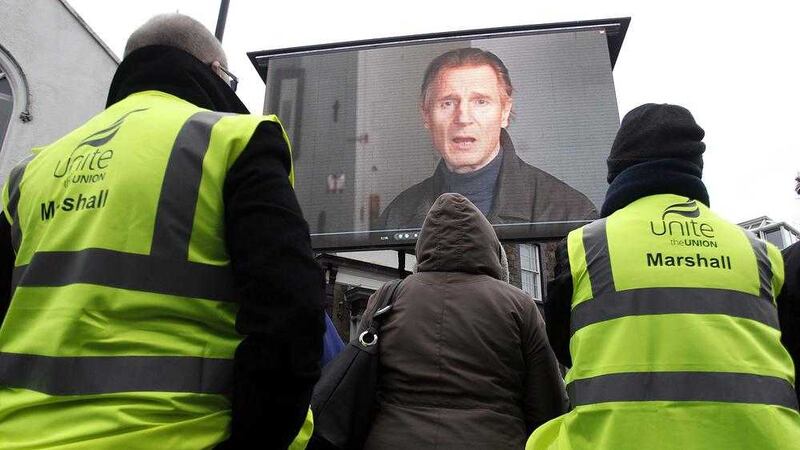WHAT happens to a town when its industries collapse? Over the next two years, Ballymena will have its own answer that question.
The Co Antrim town is due to lose 2,000 jobs when two major factories close.
Next year, cigarette firm JTI Gallaher will shut its operations, followed by the closure of the Michelin tyre factory in 2018.
The predicted devastating impact on the town hasn’t been lost on the trade unions, who organised Saturday’s major rally for more investment in the area - backed, no less, by Hollywood star and self-professed "proud Ballymena man" Liam Neeson and Co Antrim born actor James Nesbitt.
Neeson, who was made a freeman of the town in 2013, took part in a special advertisement urging people to take part in the rally and saying he backed "the demand for jobs and investment in Ballymena".
Nesbitt pointed out that the job losses not only threaten the people directly affected but also their families, the wider economy and the whole area.
With huge job losses, the closure of locally owned businesses inevitably follows. And new companies tend not to be attracted to towns full of empty factories and closed shops.
At the moment, the forecast for Ballymena doesn’t look good. If you want a clear example of what happens when once dominant manufacturing industries move out of small towns, look no further than neighbouring Ballymoney - the place where I went to school.
When I was a child, Ballymoney had several factories which supported hundreds, if not thousands, of employees.
Now most of the factories have disappeared and with their demise has come the deterioration of the town centre.
Ballymoney now feels like a commuter town - a place where people own homes but socialise and work elsewhere.
Last year, a friend of a friend joked that her husband hadn’t visited the town centre in several years even though their family home is only a 10 minute walk away.
Of course, you might argue that the demise of any town is simply the way of the world. No city or country is too big to fail.
Several decades ago the US city of Detroit was once the centre of the global motor industry.
The city had its difficulties anyway, notably deep racial divisions, but the closure of the car factories didn't help matters, leading to mass migration and a huge increase in crime rates. In 2013, the city became the largest in the US to ever file for bankruptcy.
And the unemployment rate has remained at just over 14 per cent. Despite recent attempts at regeneration, huge swathes of the city still look like ghost towns. Soon around a fifth of the city - mainly derelict or abandoned buildings - will be knocked down.
When a town fails, something is irretrievably lost. The area loses its character, along with its industries and people.
The new ‘Fresh Start’ Northern Ireland may become a homogenised place where our rural areas are not places where people live and work and raise children, but mere scenic backdrops - great if you want to attract major television shows, but not so wonderful for the people who actually want to build a life there.
The Dark Hedges in Armoy, Co Antrim, just a few miles up the road from Ballymena, existed long before Game of Thrones thought they’d make an atmospheric location.
A Chinese friend once asked me how the north actually survives. Used to huge factories and endless construction work in her home town, she could not understand what jobs people do here.
“The West relies a lot on its past,” she said and joked that most of the clothes she bought here were made in China. I tried to explain about call centres and office work and service industries but to her, as an outsider, if a place doesn’t appear to be changing then it isn’t growing.
Perhaps she was right. Perhaps the problem is that we have got so used to focusing on past economic successes that it’s more difficult to look forward.
Belfast has a huge shiny monument to the unsinkable ship that sank on its first voyage.
Derry has great pride in its distant shirt-making past. It’s unlikely that future museums will be devoted to the history of tyre or cigarette manufacture in Ballymena, but who can tell?
Rather than rely on a town’s industrial past, we need to look forward to how it can possibly sustain a future. And without a future, Ballymena will become just another commuter town, or worse, a place where no one wants to live at all.







